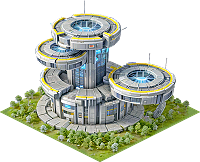
Creating your perfect city involves much more than placing buildings randomly - after all, real towns and cities are not created that way.
Happiness is the key to a great city. Keep your city's happiness high to increase residents, jobs, and, most importantly, your income.
Each building has a happiness value, determined by its surrounding environment, the area it is placed in, and the level of city services it receives. Experiment with different layouts to find the most optimal city design.

Residential buildings provide housing for your city's residents.
They are highly affected by pollution and should not be placed near commercial or industrial buildings.
Keep residential buildings grouped together, surrounded by trees and parks, for maximum happiness.

Commercial buildings provide medium-density jobs for your residents.
While mildly affected by pollution, commercial buildings should still be placed away from industrial buildings.
Commercial yields are lower than industrial but yield quicker. The greater the happiness of a commercial building, the greater the payout.
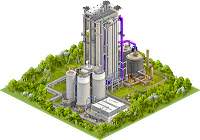
Industrial buildings provide high-density jobs for your residents.
Industrial buildings are not affected by pollution and should be placed near other industrial buildings.
Industrial yields are higher than commercial but slower. Happiness boosts the payout of industrial buildings too.

Community buildings provide low-density jobs and boost city happiness.
Only mildly affected by pollution, they can be placed anywhere.
Community employment contributes to your commercial employment totals.

Utility buildings provide low-density jobs and offer crucial services like water, power, food and trash removal.
While unaffected by pollution, utility buildings should be placed near industrial buildings.
Some power stations are highly polluting and should be isolated from the rest of the city. Utility employment adds to your industrial totals.

Transportation is key to keeping your city happy by taking the load of your road network. This will not only reduce pollution but increase city happiness to.
Build a bus and Hyperloop network to efficiently move residents around your city. Hyperloop stations need to connect to straight Hyperloop track.
Build seaports to boost your commerce and airports to move people in and out of your thriving city. Ports will need to open out onto open water to function.
Runways must have a least 3 straight runway pieces and the correct end pieces to function. When constructed correctly, the game highlights the direction that planes will land.
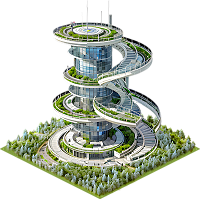
Arcologies are special self-contained communities housed within a single building. Arcologies can accomodate many thousands of residents.
They provide a balanced amount of residents and employment and can be either commercial or industrial.

Decorations boost both happiness and ecology. Increase happiness and neutralize pollution by adding parks and trees.
|
|
Add a building to your favourites list. |
|
|
Rename a building to fit your city design. |
Most buildings reduce happiness and add pollution. To balance this, include community buildings, trees, decorations, farming resources, and utilities as your city grows.
Buildings are happiest when they have adequate police, fire, education, and health coverage. The higher the coverage, the greater the happiness boost. Each building's population and job capacity can be affected by happiness levels.
Buildings can be upgraded to level 10. Upgrading increases capacity, employment, or happiness, depending on the building type. The upgrade may also affect surrounding buildings.
Buildings that cost gold to purchase will provide much more population or employment or happiness than buildings that cost game cash. They also have free upgrades and place much lower demands on your city than normal buildings.
All buildings have an area of effect and affect the buildings around them. Buildings with high pollution will negatively impact the surrounding buildings, whereas decorations and community buildings will have a positive effect on nearby structures.
Upgrading city services increases their area of effect. The coverage area expands by one tile in each direction for every two levels of upgrade. A level 10 building will cover four times the area of a standard building.
Apply zoning techniques to reduce pollution around residential and commercial areas. Ensure proper placement of utility buildings and transportation networks to minimize their impact and maximize efficiency.

Use the RCI bar to track your city's current demands. A longer bar means higher demand for that specific type of building (residential, commercial and industrial). Tap the RCI bar for in-depth analytics to help optimize your city.
In this example, commercial (blue) has the highest demand, residential (green) has medium demand and industrial (yellow) has the least demand. Balancing the demand is important to building a happy city.
Gold can be acquired through the following methods:
City happiness depends on the happiness of each building, which affects income from industrial, commercial, and transport buildings.
Ensure full employment and reduce pollution by adding trees, parks, and green energy power plants. A comprehensive Hyperloop network also helps reduce pollution.
Certain buildings will be happier next to others, experiment with your zoning to find what works for your city.
Water has high ecology so try to keep/make rivers and lakes to keep ecology up and make a great city for your residents. You can use the water tools to create lakes, rivers and coastlines.
To transfer your city, connect to your Google Play or Apple account on your first device, then install the game on your new device. Connect to the same account and sync your progress.
Your progress is saved on our servers. It is also saved locally on your device, so you can continue playing even when you don't have a network connection. The game will synchronize your progress when your device reconnects to the internet. If you are playing on multiple devices, ensure you save and close the game on one device before switching to another.
Note: If you uninstall the game, your local save will also be deleted from your device.
All leaderboards are algorithmically generated based on multiple ranking signals from your game. They are updated hourly and are not manually curated.
These leaderboards showcase the best and most liked/rated cities. To rank, you'll need to be running the latest build, playing online, maintaining a near-perfect balance, and designing an eco-friendly city with low pollution, high ecology, and happiness.
Your city also needs a realistic transportation network and building diversity (rather than just many of the same building, apart from trees and landscaping). Green cities tend to rank higher.
There are tens of thousands of qualifying cities for each leaderboard, but only 500 slots, so your city's likes and ratings will be factored in. Cities with outstanding ratings naturally rise to the top.
| DC | To be included you must be over level 150, renamed your city and have more than 50k residents. |
| DC < 250 | To be included you must be between level 100 and level 250 and have more than 50k residents. |
| DC < 500 | To be included you must be between level 250 and level 500 and have more than 50k residents. |
| DC > 500 | To be included you must be over level 500 and have more than 50k residents. |
Buildings must meet certain requirements. If they don't, the building will not function, darken, and a warning will be displayed.
 |
Your building is not connected to a road or path. |
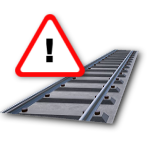 |
Your building is not connected to a Hyperloop. Train stations need to be next to Hyperloop tracks. |
 |
Your building doesn't have enough power. Add new power stations (or upgrade existing ones) in the utilities category. |
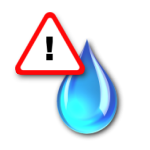 |
Your building doesn't have enough water. Add new water plants (or upgrade existing ones) in the utilities category. |
 |
Your building doesn't have enough food. Add new farming buildings (or upgrade existing ones) in the farming category. |
 |
Your building doesn't have enough trash removal. Add new recycling/waste buildings (or upgrade existing ones) in the utilities category. |
 |
Your building needs to be next to water (but isn't) or placed on water (but isn't). |
Further help can be found in our FAQ.